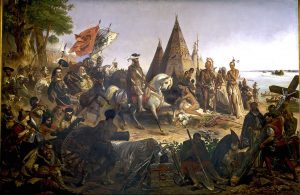- We began this unit by discussing assumptions and differences that we carry into our class. In “First Contact as Spiritual Performance,” Lutz makes an assumption about his readers (Lutz, “First Contact” 32). He asks us to begin with the assumption that comprehending the performances of the Indigenous participants is “one of the most obvious difficulties.” He explains that this is so because “one must of necessity enter a world that is distant in time and alien in culture, attempting to perceive indigenous performance through their eyes as well as those of the Europeans.” Here, Lutz is assuming either that his readers belong to the European tradition, or he is assuming that it is more difficult for a European to understand Indigenous performances – than the other way around. What do you make of this reading? Am I being fair when I point to this assumption? If so, is Lutz being fair when he makes this assumption?
“First Contact as Spiritual Performance” is an article that peeked my interest as it takes a slightly different view of what occured between Europeans and Indigenous peoples. I definitely noticed the assumption that Lutz makes here and I personally thought it was a relevant point. I think this quote from Lutz book Myth and Memory is relevant considering the past and the future, “But contact stories are not just about the past and the ‘might have been.’ Contact stories grasp out attention because they also explain how things are now, and they contain a key to how they might be.”[ Lutz 12) Personally the way I understood the statement above where Lutz says “one must of necessity enter a world that is distant in time and alien in culture, attempting to perceive indigenous performance through their eyes as well as those of the Europeans.” I interpreted it as firstly we are entering a different time for both Natives and Europeans, we are looking at the first interactions through historical accounts this therefore adds many difficulties as we have differing stories and differing world-views of men who are telling the stories. He does seem to be assuming that his reader is from a European tradition because as he says “one must of necessity enter a world that is distant in time and alien in culture“(Lutz) this statement from my interpretation points to a non indigenous culture. While indigenous people of today may be distant in time they would not be totally alienated from their heritage and culture. Lutz is not being necessarily fair when he makes this assumption it may be equally difficult for the indigenous people to understand European tradition and yet in many ways they have been forced to come to an understanding. I would not say that it would be more difficult for Europeans to understand the Native tradition then it would be difficult for Natives to understand European tradition as an overruling statement. Yet there is an element in which Europeans did not understand the Indigenous culture and this is evident in how Europeans treated Natives historically. One thing that stood out to me in the reading though was the fact that many Natives seemed to view the Europeans coming to America as not an extremely shocking event as they understood it as a supernatural event. Yet as Trigger makes it clear ” by the late nineteenth century most Native cultures had been significantly altered and disrupted by European contact.”(114 Trigger) Another element that may have made it harder for Europeans to accept the Native culture is that “European religions, though ecumenical in spirit, were exclusive and intolerant, as well as hierarchically organized and controlled.”(121 Trigger) Overall then I think that Lutz is fair in making this assumption and it is not necessarily a wrong assumption to make.

Works Cites
- Lutz, John S. Myth and Memory: Stories of Indigenous-European Contact, UBC Press, Vancouver, 2007;2014;.
- Trigger, Bruce G. Natives and Newcomers: Canada’s Heroic Age Reconsidered, McGill-Queen’s University Press, Kingston, Ont, 1985;2014;1986;.
-
“Discovery of the Mississippi.” Https://en.wikipedia.org/wiki/History_of_Native_Americans_in_the_United_States#/media/File:Discovery_of_the_Mississippi.jpg. Wikipedia, n.d. Web.